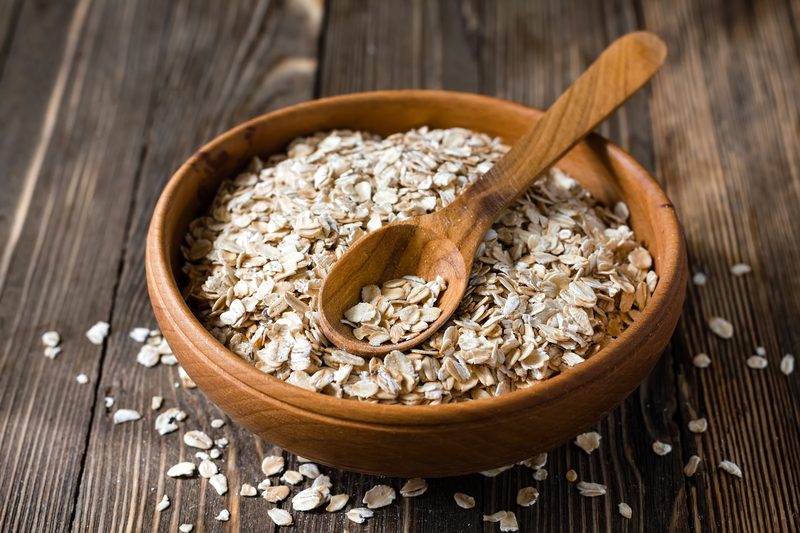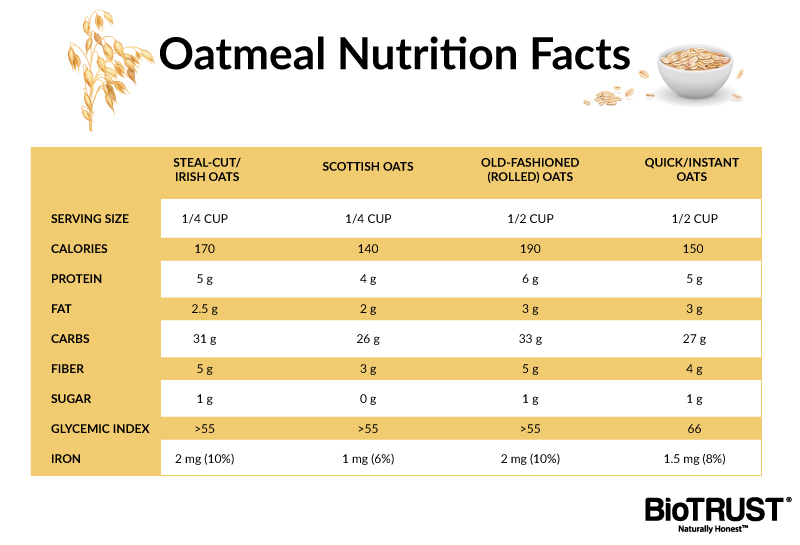Is Oatmeal Good for Weight Loss? See the Facts

Around the world—from the U.S. to Switzerland to Finland to the U.K. to Russia—oatmeal is a popular breakfast choice. One reason it’s so popular is because it’s rich in fiber, complex carbs, and protein as well as magnesium and zinc, all of which can help support a healthy gut. It’s also super easy and convenient to make. But oatmeal is also a carb-heavy food, so many people may wonder, is oatmeal good for weight loss?
According to nutritionists, oats can increase satiety (i.e., help you feel full for longer), decrease sugar highs and lows, and lower insulin levels because it is a slow-release complex carbohydrate. That said, much of how good oatmeal is for weight loss depends on how it’s served.
Oatmeal can come with a higher calorie and carb count, so it’s important to keep track of the serving size if weight loss is your goal. What about the type of oatmeal? Let’s compare some of the most popular options:

Notice that the serving size for steel-cut and Scottish oats is just a quarter cup and a serving of old-fashioned or quick oats is a half-cup. That’s dry oats. They will expand as you cook them—often doubling. (That is, a half cup of old-fashioned dry oats will become a full cup cooked as they absorb water.) All are fairly comparable, within a gram or two of protein, fat, and fiber. And they’re all good sources of iron as well as other key nutrients, such as calcium, magnesium, and potassium.
In short, oatmeal is a solid choice when it comes to healthy nutrition. Plus, oatmeal is portable, so for folks who travel a lot, bringing along a small container/packet with some oats means you always have access to a healthy meal. Just add hot water and let sit.
When it comes to instant oats, the glycemic index goes from low to medium, but you are still getting four grams of fiber. The bigger issue is that quick oats often come in packets that are also loaded with sugar. And some have hydrogenated oils, corn maltodextrin, and other not-so-healthy additives. So, as always, remember to look at the label to ensure—no matter which type of oatmeal you choose—that it contains only oats and is not combined with other additives.
Health Benefits of Oatmeal
Oatmeal has several qualities that can benefit health. Plus, research has found that people who eat oatmeal tend to eat healthier diets and weigh less overall than those who don’t. 1 Some of the key benefits of oatmeal include:
• Helps keep you full: The soluble fiber in oats can leave you feeling fuller for longer, regulating hunger, so you don’t eat as much. 2 A big part of this effect is due to the beta-glucan found in oats, which attracts water into the digestive tract, so food moves more slowly as it digests. 3
• Helps keep you regular: Oatmeal is a good source of soluble fiber, which can help soften stools, so they’re easier to pass.
• Helps keep blood sugar steady: Most oatmeal (with the exception of quick oats) has a glycemic index of ~55, which is considered a low-glycemic food. That’s about 25 points less than whole wheat bread. This low score means oats can help keep blood sugar from spiking after a meal, which is another reason it may increase satiety. Blood sugar spikes can also lead to fatigue (i.e., crashes) as well as headaches. In the long run, keeping blood sugar levels steady may help prevent diabetes as well as heart disease.
• Decreases insulin response: Because oatmeal is low glycemic and provides beta-glucan, it also doesn’t lead to a spike in insulin, which is needed to shuttle excess blood sugar or glucose into cells. 4 Keeping insulin levels lower has also been shown to support weight loss.
• May support a balanced immune system: Oatmeal provides beta-glucan, a soluble fiber that has been shown to support the activation of blood cells that fight infection.
• Support heart health: Research has shown oatmeal can help reduce low-density lipoprotein (LDL) cholesterol to help support heart health. 5
Is Oatmeal Good for Weight Loss?
While oatmeal has benefits that can help support weight loss, there are also drawbacks to avoid, such as:
• Avoiding sweet additives: Oatmeal can taste rather bland, so many people add sugar, maple syrup, honey, brown sugar, and other sweeteners as well as milk—all of which make it sweeter and more appetizing. If you aren’t careful with how much you add, however, you can increase not just the calorie count but the glycemic index, which can delete most of the health and weight-loss benefits.
It’s especially important to avoid the pre-flavored instant oats, which are highly processed, provide less fiber along with added calories, fat, carbohydrates, and sugar.
Instead, top home-cooked oatmeal with some fresh or frozen berries, a dash of cinnamon, some nuts, and perhaps a drizzle of honey or a few drops of stevia.
• Ignoring portion sizes: Oatmeal can be pretty calorie and carb dense. A portion size is between a quarter and a half cup (dry), depending on the variety. So, avoid just dumping some oatmeal into a bowl and digging in. Keep track of your portion sizes and calories and how they relate to the other foods you consume.
• Eating too much fiber too soon: High-fiber foods have numerous benefits, and most Americans don’t eat enough. However, if you haven’t been eating many high fiber foods, ease into eating more. The body needs time to adjust. Eating too much too quickly can lead to bloating, stomach pain, and uncomfortable bowel changes. Instead of adding oatmeal daily, start with just two or three servings per week. You may also want to drink more fluids as your digestive system adapts.
Is Oatmeal Good for Weight Loss: A Recap
Losing weight doesn’t come down to simply eating or avoiding a specific food—whether oatmeal, eggs, whey protein, or anything else. It’s a complex problem that can take adjustments over a longer period of time as you build a healthier lifestyle. A healthy, calorie-controlled diet is a big part of that, but so is ensuring you’re getting enough sleep, managing stress, staying hydrated, avoiding too much alcohol or sugar, and staying more active.
But, is oatmeal good for weight loss? Because oats are a nutrient-dense whole grain and thus a good source of fiber as well as a decent source of protein for a grain, they may help support healthy digestion, help keep you feeling full for longer, lower cholesterol levels, and even help keep your skin healthy. And research has found that eating oatmeal regularly (two portions per day) can help people who are overweight or obese lose weight and decrease waist circumference. 5
Fortunately, there are many delicious ways to enjoy oats, such as:
- Protein and Oat Energy Bites
- Pumpkin Pie Spice Oats
- Oatmeal Cakes
- No-Bake Energy Bites
- Hearty Oatmeal Bowls
Or, forget the formal recipe and spruce up your oats with your favorite toppings like fresh berries, nuts, nut butter, or sweet spices like cinnamon, cardamon, or cloves. You can also try a savory oatmeal by adding an egg, avocado, vegetables, and a sprinkle of cheese for a surprisingly delicious change of pace.
Finally, don’t forget to measure out the correct amount of oats, so you don’t go overboard with unnecessary carbs and calories.




 7 Signs Your Body is Seriously Low on Collagen (not just wrinkles)
7 Signs Your Body is Seriously Low on Collagen (not just wrinkles) Health Expert: "Turmeric Doesn't Work (unless...)"
Health Expert: "Turmeric Doesn't Work (unless...)" 3 Warning Signs Your Probiotic Supplement is a Total Waste
3 Warning Signs Your Probiotic Supplement is a Total Waste

